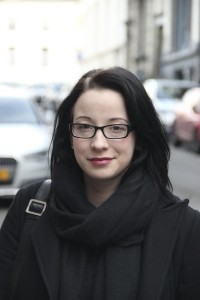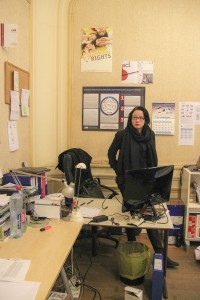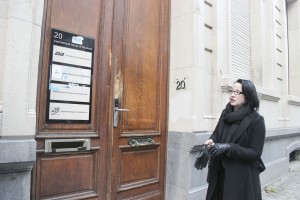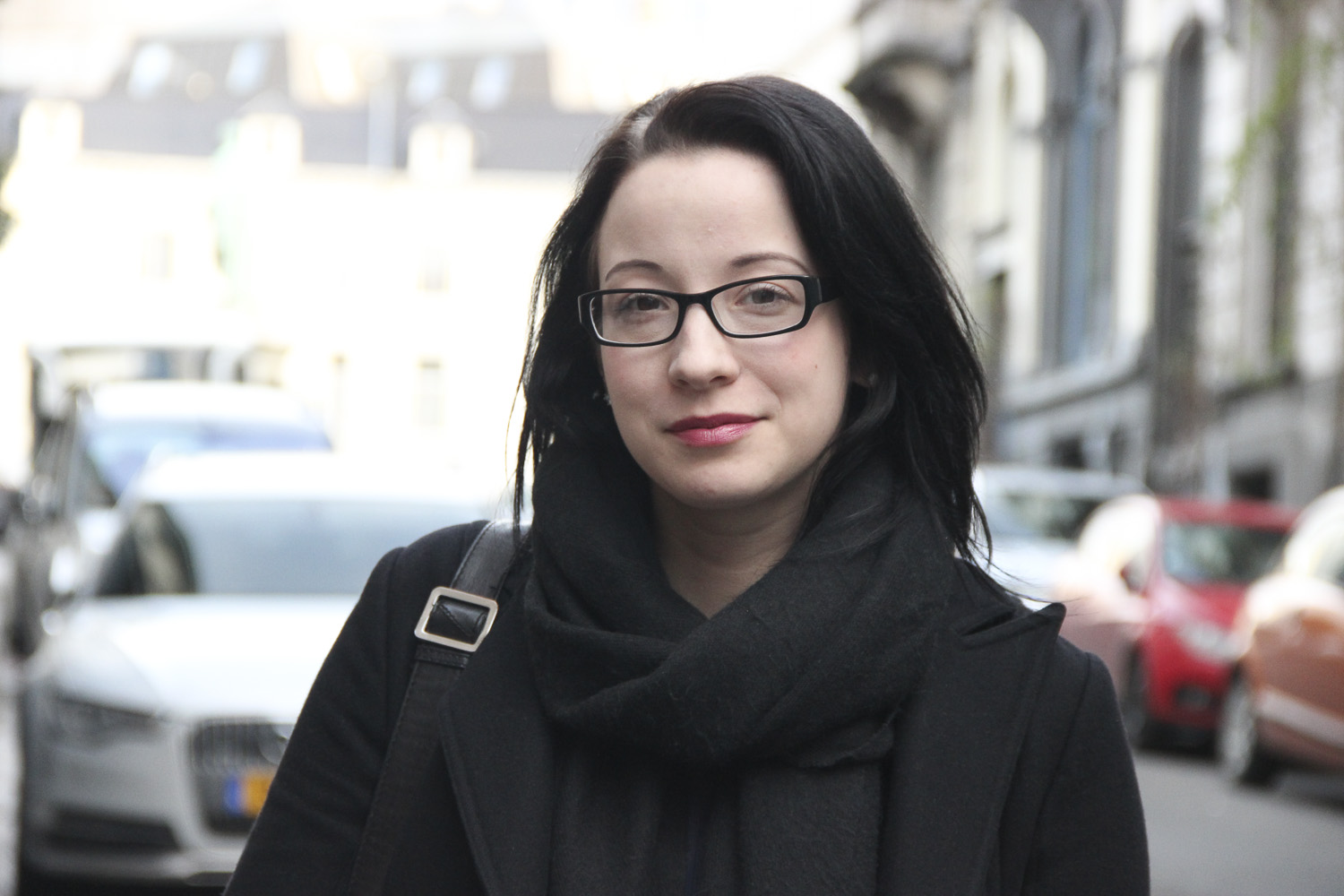Lund student and union professional, Elisabeth Gehrke, aims for the next level in her union career. Now she is running for the position as union president of the umbrella union organization, European Students’ Union. Lundagård took off for Brussels to discuss union politics, Erasmus and EU elections.

Photo: Carl-Johan Kullving
The winds of spring are blowing across Belgium. In a shabby building on 20 Zavelput street, central Brussels, resides the European Students’ Union headquarters. ESU represents student unions from 39 European Countries.
On the second floor is the ESU vice president, Elisabeth Gehrke’s, workstation. Previously, she has been operating in the Social Student Union, as Lund University Student Unions vice president (LUS), The Swedish National Union of Students (SFS) vice president, and ESU board member.
Now she is a European Students’ Union president candidate.
What does it feel like after seven months in Brussels?
“I really like it here. It’s very different from union operations in Sweden. The organization and the lobbying work differently with a lot of major EU projects. It involves a lot more people coordination than at SFS and LUS, in regards to our ESU office, as well as our board, and the ones involved in the projects. I live with my colleagues, which also creates an interesting dynamic.”
Does that make you galvanize each other in work-related matters?
“I have managed to maintain a balanced relation to that. At SFS, I couldn’t just switch off, now I can. It hits you like a hangover if you don’t relax every once in a while. The working hours are strange when you don’t work 9-to-5 and you do a lot of travelling, and work from home, since my colleagues are there. I enjoy myself a little more in a chaotic environment, it suits me. My interest has never been the organizations, because to me, they are instruments for politics.”
What have you had time to experience in Brussels?
“Not much at all. But within ESU, there is a very strong alumni-like culture. The ones still working in Brussels enable you to see more of Brussels, providing a lot of input. But the union mission takes a lot of time. I like it very much here, the culture is very open. Since everybody is an expat, it’s also convenient to move around talking to people.”
What is your relation to Lund these days?
“Christopher lives there now, my dear husband. Lund is always going to be Lund to me. When you have been operating in Lund for such a long time, it will always have a special place in your heart. My schedule is slightly chaotic, but the Carnival I will definitely attend. I’ve made it clear, the elections campaigns in Almedalen and the Carnival, you will not take from me.

Photo: Carl-Johan Kullving
Which is the hardest union level culture clash?
“The meeting culture is a big thing. For some cultures, it is completely normal to scold the elected representatives in public, and to debate everything the whole nine yards, while other unions deal with that off-schedule. It’s important that there’s a dialog between the countries, so that they don’t sit around staring at each other being annoyed.
Erasmus Plus was recently launched. In Sweden, there are only dim signs of interest for exchange programs among the students. What is to be done for the exchange traffic to take off?
“A lot of it has to do the students generally being older. I think that when you have your life in a certain country, it is much more difficult. Another aspect could be the fact that you don’t know what is expected from you abroad. Sweden provides support features, which do not exist in other countries. That level of security, combined with the effort it takes to find out, probably discourages a lot of people.
Are there any other incentive elements involved?
“The institutions should promote what is available and where you can go. The uncertainty attached to attained credits still factors in, even if it is not as big of a problem in Sweden as it is in other countries. Also, the existing financial support needs to be subjected to increase. Erasmus Plus means getting money for going on an exchange program, in addition to your student allowance. I don’t think a lot of people know that.
Prior to the Elections to the European Parliament, ESU launched a 20-point campaign. Which are the most essential ones, which the parliament members need to approve?
“The European Parliament doesn’t really have a lot of influence on education. But indirectly, by the EU Commission having higher ambitions and its education policy, the European Parliament has a responsibility I don’t think they shoulder. They agree with the Commission too often, they need more knowledge and a clear opinion. That is what we compel them to do by presenting these points. It it important that we create this reflection, since it is on them to gain knowledge and make the right decisions, not just agreeing with the Commission.
So, the most important thing is them taking their share of the responsibility?
“Yes”
Are there any particular opinions they should be for or against?
“We are of the mindset that considerable portions of education policy should not be transferred to EU level. ESU is for it being a national liability and agreements being made on a European level, which the countries fulfill. We want to see more funds in the education sector. Then, we are against the loan system introduced by the Parliament, and we want to review how and where the politics in the education sphere is. The section of the Parliament where education issues are organized is called CULT, and they manage culture, sport, youth, and education matters. It may not be the right way to go if education is a strategic domain, which has been established by the EU. Maybe a slacker Committee is not a good idea, but rather considering whether education should be paired with research.

Photo: Carl-Johan Kullving
Does ESU mainly work against the commissioners?
“We work for and against the Commission. Not the actual commissioners, since she (Androulla Vassiliou from Cyprus) is more of a spokesperson, I would say. She has a European counterpart to the Ministry of Education, with which we collaborate. Also, in the context of the Bologna Process, we operate as an active party. We also have lots of organizations influencing education, such as Council of Europe and OECD. All of them want to influence the countries, we try to influence the ones trying to influence the countries.”
How is ESU affected by the Elections to the European Parliament?
“Not very much. It could have a greater effect if there is a new power balance in the Parliament, and that would affect the Commission, and which factual matters will be core issues. It would be good if Sweden could have somebody in CULT, we don’t have anybody. If a decent candidate comes along with decent values, and who wants to represent CULT, that’s where my vote will go, since these are the matters I care about. The biggest thing going on in the near futures is the Ministerial Conference, which takes place next year, revolving around the Bologna Process.
The Bologna Process which is to be renegotiated in 2015?
“Yes, mid May of 2015. At that point, the future of the education domain will be set in Europe. The Bologna Process has become a bit stagnant. It doesn’t operate as fast as we would want it to, and the countries aren’t always doing what they are supposed to. It will be a huge discussion on the Bologna Process of the future. It will be an important meeting for us.”
Swedish Social Democrats enters the elections wanting to abolish tuition fees for non-European students, which were introduced in 2011. Are there any similar tendencies in Europe?
“Absolutely. In areas where tuition fees have been introduced, the people in charge were severely punished the following elections, like in Germany for instance. When some regions had introduced tuition fees, they were punished in the following elections, since the new parties entered and abolished the tuition fees. There is no doubt there are such tendencies, but also going in the other direction. A lot of it derives from the financial crisis.
Do you have the same level of motivation for the union position as when you started?
“The motivation comes from the people I work with. And the access to higher education is a major issue to me. I more and more realize how privileged I am to have been born in Sweden, and I wouldn’t have been here if I were born somewhere else. Next year is a big year, with the Ministerial Conference, and the fact that the UN has established a post-2015 aim of including higher education issues as well, meaning that we need to jump-start some kind of international partnership, so that they take our opinions into consideration. And then, there will be a new Parliament and a new Commissioner, and it is imperative that we establish good relations to them.
International partnership with the UN… Will there be a UN Student Union?
“There was a similar organization before, but there are no visions of creating anything like that.
It is very challenging to have a global organization, since it is difficult to get along politically. We are one of the leading organizations internationally, and thus, some countries expect us to handle it, at the same time as some countries frown upon us handling it. Europe has a colonial history which needs to be taken into consideration. It’s not like the Unions in Europe will come and rescue the unions in South America and Africa.
What is the next step for you? You have been at LUS, SFS, ESU. Is there another level in the union community?
“There’s one more… I am running for ESU president next year. SFS nominates me. After that, I don’t know. The most common job for our alumni within the ESU, is researching within the higher education domain. But for me, I don’t know… It’s hard to think about right now.
Do you have any plans of returning to Lund?
“Well, I don’t have any opposing candidate, so… No, but… Maybe, I haven’t thought about it a lot. At some point, I will take my Master’s degree as well, but I don’t know in what field.
Text: Carl-Johan Kullving
Translation: Maximilian Aleman-Tennell






